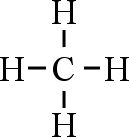Водород
Водород is the Russian word for hydrogen. The English word is made up of Greek roots where ὑδρο- (hydro-) means ‘water’ and γεν- (gen-) means ‘‘bring forth/become,” thus hydrogen means “the substance that forms water.” Notice that the Russian word is formed similarly: the root вод- means ‘water’ and the root род- means “give birth to”; thus the Russian words also means “the substance that forms water.” It is not a coincidence that these words have a similar structure. When one language models a new word by following the structure of the word in another language but subsitutes its own roots, that word is called a calque. The use of calques in a language is a very sensible way to build new words. A Russian child can learn the word водород and immediately see a connection between the word and the substance ‘water.’ An English speaking child will most likely never see the connection between hydrogen and water unless he takes a class on English roots or studies Greek.
Just as in English, водород is usually only used in the singular; we rarely say ‘hydrogens.’ It declines perfectly regularly:
| Sg | |
| Nom | водород |
| Acc | |
| Gen | водорода |
| Pre | водороде |
| Dat | водороду |
| Ins | водородом |
Let's explore some sample sentences:
| Молекула воды состоит из двух атомов водорода и одного атома кислорода. | A molecule of water consists of two atoms of hydrogen and one atom of oxygen. |
| Молекулу воды составляют два атома водорода и один атом кислорода. | A molecule of water is composed of two atoms of hydrogen and one atom of oxygen. |
| Молекулы, главные состявляющие которых водород и углерод, называются органическими молекулами. | Molecules whose main components are hydrogen and carbon are called organic molecules.¹ |
| Самая простая органическая молекула — метан. Его составляют один атом углерода и четыре атома водорода. | The simplest organic molecule is methane. It is made of one carbon atom and four hydrogen atoms. |
If you see a diagram of methane in a Russian textbook, you will something like this:

Notice that Latin letters are used, not Cyrillic letters. That's an international convention, which means that when you begin reading Russian chemistry articles, you will be able to understand the diagrams easily, although of course you will still have to learn the Russian names of the elements to discuss them intelligently.
Henry Cavendish is usually credited as first identifying hydrogen as a discrete substance in 1766 (source). Before that, mankind rarely saw the substance in its pure gaseous form on Earth. In the eighteen hundreds it was discovered in the sun and other stars by its spectral signature. This was a great shock. This substance, whose gaseous form was completely outside the day-to-day experience of most ordinary human beings, turned out to be the most common form of matter in the universe.² This strange truth reminds me of a line from the song Fireflies: “Everything is never as it seems.”³ At every moment of every day we should remember that everything is different from what it appears to be, whether the seeming solidity of the table in front of us or the blueness of the sky or the unexpected short-temper of our neighbor. In relating to inanimate things, this should give us a sense of wonder at the beauty and complexity of physical existence. In relating to living beings, it should give us a sense of graciousness and compassion toward the occasional quirks of others since we never truly know the pains that underlie them. In both cases we can be reminded of the incredible privilege of being alive and conscious at this moment.
¹ Not all organic molecules necessarily have hydrogen. I'm fudging for the sake of this blog entry.
² Nowadays some scientists posit that the majority of the universe's mass may be in dark matter, which has a corollary that hydrogen may not be the most abundant substance in the universe. Nota bene: even those who are expert in their subject may have to radically shift their views on subjects they know well, thus we should all hold our opinions with an easy grace, open to change.
³ The most common way to say this in English is “Nothing is ever as it seems.” Adam Young showed a beautiful artistic touch when he rephrased it in this song.
4 comments
And of course, кислород for oxygen functions the same way. Кисло = bitter or acidic; ὀξύς (oxys )means sharp or acidic too.
So if водород gives birth to вода, then углерод gives birth to … corners? I tried to find what the corresponding root would be for carbon, but wasn’t sure.
Don responds: Уголь = coal. Neat, huh?
Another interesting thing about this is how we pronounce that “H". We say “аш". Not “ха", not “хэ", not “эйч". The same goes for carbon sign “C” - it’s “цэ", not “си” or “эс".
Water - H20 - аш-два-о
Methane - CH4 - цэ-аш-четыре
Ethyl alcohol - C2H5OH - цэ-два аш-пять о-аш
Sylphic acid H2SO4 - аш-два эс-о-четыре
Form is loading...